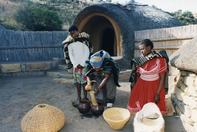Organisation of Household Members
In earlier times the Basotho daily life followed a routine, with a rigid division of labour based on age and gender. The day began at sunrise, when the family would rise. Since maize replaced sorghum as the staple food, a typical breakfast has been maize meal with boiled or sour milk and, very occasionally, meat.

Household members usually ate together in the main house or, on sunny mornings, in the courtyard. When visitors were present, the men ate first and women and children ate the remains. Historically, Basotho men ate in the lekhotla where their wives waited on them. The men assembled in the lekhotla to participate in a trial, or in helping to settle a dispute that had been brought to the chief or headman; or they discussed current issues.
Those with special avocations, for instance herbalists, diviners and basket-makers, spent some time practising their professions and collecting ingredients and raw materials.
Much of their time was devoted to the welfare of their livestock; when cattle-drawn ploughs were introduced from Europe the men took on the responsibility for ploughing, a task that was previously the work of women using digging sticks and hoes, although it was men who cleared new areas of bush for use as fields.
On the whole, the men's routine was uncomplicated and leisurely except in times of cattle raiding. Women's duties, which varied according to season and status, were more strenuous than men's.
They swept and cleaned the home, prepared breakfast, fetched water, and weeded and harvested the crops. This could keep them in the fields from long before sunrise until sunset. Grinding corn was often done by older daughters.
During quiet periods, women tended to the upkeep of their homes, replastering walls and floors with mud, replacing broken reeds in the fences and doing other domestic chores. What little leisure time they had was usually spent visiting friends and relatives. From an early age children were given specific duties to perform each day. Boys herded the family's goats and, when they were older, cattle. Girls helped their mothers with domestic chores.